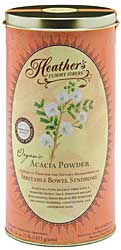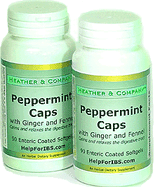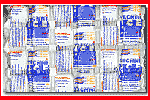| |
 |

Gut-directed hypnosis is one of the most effective ways to help relieve all IBS symptoms! Results can last more than 5 years.

In this Issue...
Food & Recipes
Special Events
Rx News & Research
Ask Heather
About Us

Certified Organic
Acacia Senegal
Tummy Fiber
The prebiotic 100% soluble fiber that relieves both diarrhea and constipation!

Try Peppermint Caps
The Best for Pain!

Get the IBS Diet Kit!
With Eating for IBS, plus organic fennel tea for bloating and gas, plus peppermint caps to prevent spasms and pain.
Take control of your IBS!

Get stable now ~
and stay that way!
Did you miss the latest
IBS newsletter and
Thanksgiving
recipes?
Past issues
are posted here!


Try Fennel Tummy Tea
The Best for Bloating!
 Need help?
Need help?
Have questions?
Come
join the IBS Message Boards!


The IBS Starter Kit!
Learn every way possible to successfully manage your symptoms!
With the First Year: IBS, an essential guide, plus Eating for IBS, plus Acacia Tummy Fiber to start stabilizing immediately!

Thanks to all of you who support this newsletter through voluntary subscriptions - I am truly grateful.
As always, if you have paid for a subscription but have not received a special email thank you, please simply reply to this newsletter to let me know!

Support the
IBS Newsletter
& Message Boards
Please become a
voluntary subscriber!
Check here for info...


Heat Therapy for
IBS
Hot packs can help prevent stress-related attacks!
Wondering about Zelnorm?
Get the real facts about this drug for women with constipation and bloating.
|
 |
|
| |

IF YOUR NEWSLETTER IS HARD TO READ OR IF THE LINKS DON'T WORK,
Please copy and paste this address into your browser window:
http://www.helpforibs.com/news/newsletter/antidep120303.html
December 3, 2003
This week ~ Polycystic ovarian syndrome, diabetes, and soluble fiber
Hello to everyone!
Are you looking for a little holiday season indulgence? Sweet treats are often problematic for IBS, but today's recipe takes care of that. Our Antidepressant Brownies are courtesy of TessLouise, the fabulous IBS Recipe Message Board moderator, and they are spectacularly delicious! Better still, they're low fat, dairy free, and have a good soluble fiber foundation. If you're an incurable chocolate-addict, this is the recipe for you.
As always, we have the latest IBS and digestive health news, research, and studies as well, so whip up a batch of brownies and you can munch as you read!
Best Wishes,
Heather Van Vorous

TessLouise's Antidepressant Brownies
2 tablespoons Acacia Tummy Fiber (optional)
3/4 cup unsweetened cocoa powder
1/2 teaspoon baking soda
1/3 cup canola oil
1/2 cup boiling water
1/3 cup applesauce
2 cups sugar
4 egg whites
1 1/3 cups all-purpose flour
1 teaspoon vanilla
Preheat the oven to 350F. Spray a 9 x 13" baking pan with cooking oil and set aside.
In a large bowl, whisk together the cocoa and baking soda. Blend in the oil, and mix until smooth. Pour in the boiling water, stirring until the mixture thickens. Stir in the applesauce, the sugar, and the egg whites. Mix until smooth.
Add the flour and the vanilla. Blend completely - there should be no lumps. Pour into the prepared baking pan. Spread the batter evenly to avoid crispy edges.
Bake for 35 to 40 minutes (25-30 minutes if using a Pyrex pan), until just set in the middle.
Let cool and cut into squares.
For hundreds of delicious recipes, come visit the IBS Recipe Exchange Message Board!
Are you just learning how to eat for IBS? A little intimidated at the thought of special IBS recipes? Don't worry! Come see
the IBS Diet pages, and find the answers to all your questions.
 Free Fibromyalgia AWARE Magazine for IBS Newsletter Subscribers!
Free Fibromyalgia AWARE Magazine for IBS Newsletter Subscribers!
If you missed the last newsletter, I'm delighted to announce that I am collaborating with the National Fibromyalgia Assocation to provide patients with more avenues for finding reliable information on IBS and fibromyalgia - two chronic illnesses that often overlap. The National Fibromyalgia Association has graciously offered to provide my IBS Newsletter subscribers with a free copy of their latest issue of Fibromyalgia AWARE magazine. Simply email your mailing address to Lauren Glick at lglick@fmaware.org and tell her Heather sent you, and you will receive your free issue of Fibromyalgia AWARE magazine in the next few weeks.
Fibromyalgia AWARE magazine has been an important publication for
patients, medical professionals, FM friends and family. It is the only
consumer publication focusing on fibromyalgia and overlapping conditions
on the market today. Created by FM survivors and the top FM medical
professionals in the country, Fibromyalgia AWARE magazine offers the
most reliable information on the illness, treatment, and research. Most
importantly, Fibromyalgia AWARE gives patients the hope and motivation
to live well with FM.
 Renzapride Improves Symptoms in Constipation-Predominant IBS
Renzapride Improves Symptoms in Constipation-Predominant IBS
Renzapride, a new 5-HT4 agonist/5-HT3 antagonist, relieves the symptoms of constipation-predominant irritable bowel syndrome, increasing bowel movement frequency and softening stools. In this large, placebo controlled, double blind Phase IIb trial that enrolled 510 patients with C-IBS, 125 received 1 mg of renzapride, 125 other patients received 2 mg of the drug, and 135 received 4 mg of renzapride, while 125 received placebo. Treatment was dosed every day for 12 weeks. Patients kept diaries to record their perceived response to treatment in terms of pain or discomfort relief, and recorded their frequency of bowel movements and the consistency of their stools.
Check here for more
information...
Pharmacological Options for IBS
Pharmacological options aim to control irritable bowel syndrome symptoms, bowel alterations and abdominal pain with drugs mainly targeted to the gastrointestinal tract or the central nervous system. The majority of the available drugs have been tested and are used in the management of individual symptoms, and not to control the whole range of symptoms inherent in the complex irritable bowel syndrome. Loperamide has been shown to be effective in the control of functional diarrhoea, and osmotic and contact laxatives and polyethylene solution in the control of functional constipation. These agents, however, have no effect on, or may even aggravate, other symptoms, such as pain and bloating.[49,50] In addition, their use is indicated only as a symptomatic, on-demand treatment in selected patients, as their effect may be unpredictable or even undesirable in the majority of irritable bowel syndrome patients who present with an alternating bowel pattern.
The smooth muscle relaxants, cimetropium bromide, pinaverium bromide, octilonium bromide, trimebutine and mebeverine, have been shown to be more effective than placebo in three meta-analyses. On average, the global symptom improvement with myorelaxants exceeded that of placebo by 22%. However, the benefit was due essentially to their effect on abdominal pain and abdominal distension (18% and 14% over placebo, respectively) with no effect on bowel alterations.
Check here for more
information...
Probiotic Improves GI Symptoms in Patients with Chronic Constipation
A probiotic beverage containing Lactobacillus casei Shirota improves gastrointestinal symptoms in patients with chronic constipation. The consumption of LcS resulted in a significant improvement in self-reported severity of constipation and stool consistency, starting in the second week of the intervention phase. Severe and moderately severe constipation was observed less in the LcS group. The occurrence and degree of flatulence or bloating sensation did not change. In the final examination, 89% of the LcS group and 56% of the placebo group showed a positive effect of their beverage on constipation. No adverse reactions were reported. The results indicate a beneficial effect on gastrointestinal symptoms of patients with chronic constipation. The administration of probiotic foodstuffs may be recommended as an adjunctive therapy of chronic constipation.
Check here for more
information...
Environmental Factors May Play a Role in the Pathogenesis of IBD
The clinical spectrum of inflammatory bowel disease (IBD) is evolving, results of a study published in the October issue of the Journal of Pediatrics suggest. The findings point to changing environmental factors as contributors to the pathogenesis of the disease. In a population-based study, Dr. Subra Kugathasan, of the Medical College of Wisconsin, Milwaukee, and colleagues examined the incidence of pediatric IBD and defined clinical characteristics of the disease. Demographic and clinical data on all new cases of IBD in Wisconsin over a 2-year period were prospectively analyzed. Only 11% of the newly diagnoses IBD cases had first- or second-degree relatives with a history of the disease. The lack of family history and the higher incidence of Crohn's disease than ulcerative colitis suggest to the investigators that new environmental factors are involved.
Check here for more
information...
Familial Aggregation of Irritable Bowel Syndrome
Patients with irritable bowel syndrome (IBS) often report family members with similar symptoms, but family studies are lacking. This study hypothesised that if there is familial aggregation, there would be an increased frequency of IBS in first degree relatives of IBS patients compared with relatives of controls (the patient's spouse). The conclusion was that familial aggregation of IBS occurs, supporting a genetic or intrafamilial environment component, but this may be explained in part by familial aggregation of somatisation.
Check here for more
information...
Overlapping Upper and Lower GI Symptoms in IBS Patients
Distinguishing between irritable bowel syndrome (IBS) and functional dyspepsia can be challenging because of the variations in symptom patterns, which commonly overlap. However, the overlap is poorly quantified, and it is equally uncertain whether symptom patterns differ in subgroups of IBS arbitrarily defined by primary bowel patterns of constipation (IBS-C) and diarrhea (IBS-D). This study aimed to determine and to compare the distribution of GI symptoms, both, upper and lower, among IBS-C and IBS-D patients. The conclusion was that upper GI symptoms consistent with functional dyspepsia were more frequent in IBS-C. Although there was considerable overlap of upper and lower GI symptoms in patients with IBS-C and IBS-D, the former had more frequent lower abdominal pain and bloating.
Check here for more
information...
Looking for the latest IBS research and news?
Check out the IBS Research Library!
 All About Tummy Fiber, Polycystic Ovarian Syndrome & Diabetes
All About Tummy Fiber, Polycystic Ovarian Syndrome & Diabetes
"I'd like to try Acacia. How should I start? How do I switch to Acacia from another fiber supplement? How much should I take? How often? When? In hot or cold liquids? In foods? Is Acacia high carb? Will it make me gain weight? Can I take it if I'm diabetic?"
Since introducing Tummy Fiber Acacia, I've been swamped with questions from folks who are wondering exactly how they should use it, so hopefully this column will answer everyone's concerns. First of all, Acacia is a pure, organic, soluble fiber supplement. It's a natural plant dietary fiber that is completely soluble - it contains no insoluble fiber at all. Soluble fiber of all kinds has a traditional and historical use for managing digestive health: it soothes and regulates the digestive tract, helps prevent cramping by stabilizing intestinal contractions, promotes normal bowel function, and aids BOTH diarrhea and constipation by regulating bowel water content.*
Tummy Fiber differs from other soluble fiber supplements in that it is organic and kosher, it's not hydrolized, and it has no additives, fillers, colors, sweeteners, flavors, or citric acid. It dissolves completely into water or moist foods and is tasteless, odorless, colorless, grit-free, and non-thickening.
"How do I switch to Tummy Fiber from another fiber supplement?"
If you've been taking another soluble fiber supplement (Benefiber, Fibercon, Citrucel, etc.) and you're simply switching to Acacia, calculate your current daily dosage in grams (your bottle label will have this information) and begin with the equivalent amount of grams of Acacia. One tablespoon of Acacia has 6 grams of soluble fiber.
"How much should I take? How often? When?"
If you're not currently taking a soluble fiber supplement, begin with a low dose of Acacia (try 1 teaspoon twice daily) and gradually increase. Raise your dosage level by 1 teaspoon at a time, every few days or every week, until your bowel function has stabilized. Diarrhea and spasms should resolve in just a few days, especially as you increase your dose; constipation, particularly if it has been chronic and severe, may take several weeks. Try to gradually increase your Acacia until you're taking 12-15 grams daily (this is about 3 tablespoons). It's always best to divide your daily dosage of Acacia into two or three doses (or even four), as the whole point of taking a soluble fiber supplement is to keep your gut filled with soluble fiber at all times. This will help to prevent bowel dysfunction and abdominal pain in the first place, and with IBS it's always better to keep yourself stable and head off problems, instead of trying to resolve attacks once they've begun.
I find it most helpful to take Tummy Fiber on an empty stomach, first thing in the morning and again before meals. It provides a great soluble fiber "buffer" for meals that follow, and it's a terrific way to get and keep myself stable as soon as I roll out of bed. It also gives a good safety margin when I've gone too long without eating, or when I know I'll be eating a meal that is too high in fat or insoluble fiber for digestive safety. This is most often a factor with restaurant meals, so I make a habit of taking Acacia right before I leave the house to go out to eat. If mornings are your worst time of day as they are mine, taking a dose just before you go to bed at night can help head off problems when you arise.
Though Tummy Fiber Acacia has the benefits of all soluble fibers in terms of helping to normalize bowel function and motility, clinical studies have shown that it also increases good gut flora. This is why Acacia will actively help reduce bloating and gas, wherease other types of soluble fiber supplements (particularly psyllium, and for some folks guar gum as well) can worsen these symptoms. The prebiotic effect of Acacia (this simply means that it supports the growth of probiotics - beneficial bacteria - in your gut) can show very quickly or can take several weeks of daily use. In essence, the Acacia is building up the beneficial flora in your GI tract to a healthy level, and how quickly you see results from this can depend on the state of your gut flora in the first place.
The active benefits from Acacia in terms of a reduction in gas and bloating are separate from the fact that Acacia is less likely to cause gas and bloating in the first place. This aspect of the supplement is termed its "gastrointestinal tolerance" - Acacia actually slows down colonic fermentation, which decreases gas and bloating. This means that on top of the fact that you should see a reduction in gas and bloating once the prebiotic effect is in full swing, you also should not see any increase in gas or bloating when you start the supplement in the first place.
"Should I take it in hot or cold liquids? In foods?"
Tummy Fiber Acacia, like all soluble fibers, needs plenty of water in order to work properly. Take each dose with an 8 ounce glass of water (more if you like), and make sure that you're drinking a bare minimum of 64 ounces of water daily. Helpful herbal teas like fennel, peppermint, and chamomile will count towards your water intake. You can also add Acacia directly to your herbal teas, or sprinkle on any moist foods, such as cereals, pastas, puddings, etc. You can add a few tablespoons of Acacia to many recipes as you cook to get extra soluble fiber in your meals. This works very well with soups, rice dishes, casseroles, hot cereals, and more.
Tummy Fiber dissolves best in cold or warm - not hot - liquids. It dissolve well in both cold and hot moist foods. Very hot or boiling hot liquids are problematic, as Acacia is a cold-water
soluble gum. If you wish to have Acacia in a very hot beverage, you can dissolve it first in cool water and then heat the liquid to make your hot drink, or you can let a hot beverage cool to drinking temperature first before adding the Acacia. If the liquid is still quite hot when you add the Acacia, it works well to blend it in with a fork instead of a spoon.
"Is Tummy Fiber high carb? Will it make me gain weight? Can I take it if I'm diabetic?"
For folks who are worried about weight gain, glycemic control, diabetes, polycystic ovarian syndrome (PCOS), or their carbohydrate intake, Acacia is a great way to get the benefits of soluble fiber without any carbohydrates or calories. The FDA has declared water-soluble gums such as Acacia to be a good source of soluble dietary fiber, which by definition means that they are not digested in the human gut. However, the FDA has also mandated that the caloric value of gums be declared as a carbohydrate with 4 calories per gram. The FDA is currently being petitioned by scientists on the Calorie Control Council to change this mandate, as it has been established that gums do not contribute calories as carbohydrates do, since gums are not completely metabolized in the body. In plain English, this simply means that though FDA labeling requires all soluble fiber supplements, including Acacia, to list a calorie content, in reality there are virtually no calories in Acacia.
The net result of this is that you are getting all of the benefits of soluble fiber without any carbohydrates or calories. For diabetes and other diseases, there are terrific advantages to a diet high in soluble fiber. Soluble fiber slows the rate of carbohydrate absorption (this gives an advantage to taking Acacia right before a meal), improves regulation of blood sugar, and lowers insulin requirements. Soluble fiber also decreases LDL ("bad") blood cholesterol levels, and therefore reduces the risk of heart disease, which is a serious risk for diabetics. PCOS patients are often found to have insulin resistance, and soluble fiber can help to stabilize their blood sugar levels by slowing the absorption of food sugars into the bloodstream, and therefore decreasing the insulin secretion of the pancreas.
* These statements have not been evaluated by the FDA. This product is not intended to diagnose, treat, cure or prevent any disease.
 Heather & Company for IBS, LLC is dedicated to serving people with Irritable Bowel Syndrome. Our mission is to provide education, support, and products that allow people with IBS to successfully manage their symptoms through lifestyle modifications.
Heather & Company for IBS, LLC is dedicated to serving people with Irritable Bowel Syndrome. Our mission is to provide education, support, and products that allow people with IBS to successfully manage their symptoms through lifestyle modifications.
We offer extensive information and tangible help for IBS, including the world's best-selling and best-reviewed books for the disorder. We provide the internet's top IBS web site resources; a twice-monthly IBS Newsletter; seminars and classes; dietary brochures for patient distribution by health care professionals; an IBS Research Library; and Heather Cooks!, a healthy cooking show on Seattle television. Much of our work is based on Heather's development of the first and only comprehensive IBS dietary guidelines and recipes, an achievement which has earned numerous awards and accolades as well as thousands of thank you letters from IBS sufferers.
Heather & Company also provides the only patient-expert moderated IBS Message Boards on the internet with forums for diet, recipes, hypnotherapy, yoga, plus Crohn's and Colitis. In addition, we support and coordinate the formation and continuation of local in-person IBS support groups across the USA, Canada, the UK, Australia, and New Zealand. We will soon have other IBS services and products available.
Our website receives over 1.5 million visits each year, and our newsletter is sent to over 18,000 people. Every month over one thousand new people join our email list. We are regular exhibitors at the Digestive Disease Week and American Dietetic Association conferences.
Sponsorship opportunities are available for the message boards and this newsletter for companies and/or products that have been legitimately established as helpful for digestive disorders.
Please contact us for information.

You are receiving this email because you have expressed interest in IBS news and information.
To unsubscribe from Heather's IBS Newsletter, click here http://www.helpforibs.com/news/unsub.asp or send an email to heather@helpforibs.com.
If you are viewing this newsletter on a website and would like to subscribe for email delivery, please "Join the IBS Newsletter" here.
ANTI-SPAM PRIVACY POLICY
LEGAL DISCLAIMER - This email is not intended to replace the services of a physician, nor does it constitute a doctor-patient relationship. Any application of the recommendations in this email is at the reader's discretion. Heather Van Vorous and Heather & Company for IBS, LLC are not liable for any direct or indirect claim, loss or damage resulting from use of this email and/or any web site(s) linked to/from it. Readers should consult their own physicians concerning the recommendations in this email.
© 2003 Heather & Company for IBS, LLC. All rights reserved.
|
|
|
|